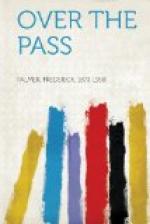“Father,” Jack went on, “I want a long talk quite alone with you. When it is over I feel that we shall both know each other better; we can work together in a fuller understanding.”
“Yes, Jack,” answered the father, cautiously feeling his way with a swift upward glance, which fell again to the paper. “Well, what is it now? Come on!”
“There are a lot of questions I want to ask—family questions.”
“Family questions?” The fingers paused in playing with the paper for an instant and went on playing again. The soft hands were as white as the paper. “Family questions, eh? Well, there isn’t much to our family except you and I and that old ancestor—and a long talk, you say?”
“Yes. I thought that probably this would be a good time; you could give me an hour now. It might not take that long.”
Jack’s voice was even and engaging and respectful. But it seemed to fill the room with many echoing whispers.
“I have a very busy day before me,” the father said, still without looking up. He was talking to a little pad at one corner of the green blotter which had a list of his appointments. “Your questions are not so imperative that they cannot wait?”
“Then shall it be at dinner?” Jack asked.
“At dinner? No. I have an engagement for dinner.”
“Shall you be home early? Shall I wait up for you?” Jack persisted.
“Yes, that’s it! Say at nine. I’ll make a point of it—in the library at nine!” John Wingfield, Sr.’s hand slipped away from the papers and patted the back of Jack’s hand. “And come on with your questions. I will answer every one that I can.” He was looking up at Jack now, smilingly and attractively in his frankness. “Every one that I can, from the first John Wingfield right down to the present!”
But the hand that lay on Jack’s was cold and its movement nervous and spasmodic.
“Thank you, father. I knew you would. I haven’t forgotten your wish that I should bring all my doubts and questions to you,” said Jack, happily. And in an impulse which had the devoutness of a rising hope he took that cold, soft hand in both of his and gave it a shake; and the feel of the son’s grip, firm and warm, remained with John Wingfield, Sr. while he stared at the door through which Jack had passed out. When he had pulled himself together he asked Mortimer to connect him with Dr. Bennington.
“Doctor, I want a little talk with you to-night before nine,” he said. “Could you dine with me—not at the house—say at the club? Yes—excellent—and make it at seven. Yes. Good-by!”
XXXII
A CRISIS IN THE WINGFIELD LIBRARY
A library atmosphere was missing from the Wingfield library, with its heavy panelling and rows of red and blue morocco backs. Rather the suggestion was of a bastion of privacy, where a man of action might make his plans or take counsel at leisure amid rich and mellow surroundings. Here, John Wingfield, Sr. had gained points through post-prandial geniality which he could never have won in the presence of the battery of push-buttons; here, his most successful conceptions had come to him; here, he had known the greatest moments of his life. He was right in saying that he loved his library; but he hardly loved it for its books.




